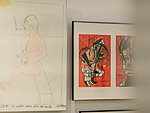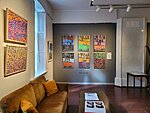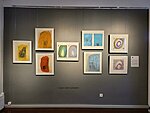September 16th until November 5th 2023
Occupation: Artist
In 2024, Europe will have three Capitals of Culture: Bodø in Norway, Tartu in Estonia and Bad Ischl in Austria. Just like Tartu holds the title of Capital of Culture together with 19 South-Estonian municipalities, Bad Ischl Salzkammergut includes 22 municipalities from the provinces of Upper Austria and Styria.
In August 2021, when preparing for the European Capital of Culture programme, the exhibition curators went to the Upper Austrian city of Gmunden, which, like Viljandi, will be part of the European Capital of Culture in 2024.
In Gmunden, there is one of Austria's many art workshops for people with special needs (Kunstwerkstatt Lebenshilfe), part of the Lebenshilfe (“Life Help”) network.
In 1992, artist Ferdinand Reisenbichler founded an open studio, based on the Lebenshilfe Oberöstterreich silk painting workshop, for people with mental and multiple disabilities needing special support, and worked out its principles. The professionally equipped studio selects talented and mutually well-matched artists from a large pool of applicants to start working there after a probationary period. The supervisor decides on whether to accept a newcomer together with the group. To participate in exhibitions, the artists usually need to have worked in the studio for a couple of years and, above all, have an original and clear visual language. The artists spend most of the week in the open studio, but on two days they are in the Galerie Tacheles in the old part of Gmunden.
Following its motto, “to promote and support personal development through artistic development and raise each group member’s social competence”, the studio organises annual national inclusive art projects for artists needing special support, collaborates with other studios and major enterprises, and organises exhibitions. The studio makes every effort to ensure that people with special needs are recognised as fully worthy members of society. For example, the large pictures by Lebenshilfe artists which were placed on commercial vehicles were very well received. After several years, when they were worn out, the works were removed from the sides of the vehicles and recycled into eye-catching shopping bags.
For the Estonian exhibition, the curators selected almost a hundred works from six artists of high artistic quality. These artists are Ernst Schmid, Julia Rakuschan, Sigrid Reingruber, Franz Krummholz, Christian Rebhan and Andreas Krötzl.
The exhibition is part of the “Hidden Worlds Expanding” project which belongs to the main programme of the European Capital of Culture Tartu 2024. Next year, a return visit to Austria is planned to showcase works from the Kondas Centre's art collection at Galerie Tacheles.
The exhibition is supported by the Embassy of Austria in Estonia.
Special thanks to: Ferdinand Reisenbichler, Heidi Zednik, Eva Mair and Sylvia Vorwagner.
Written by Mari Vallikivi and Eva Laantee Reintamm
%20(1)-1.jpg)



